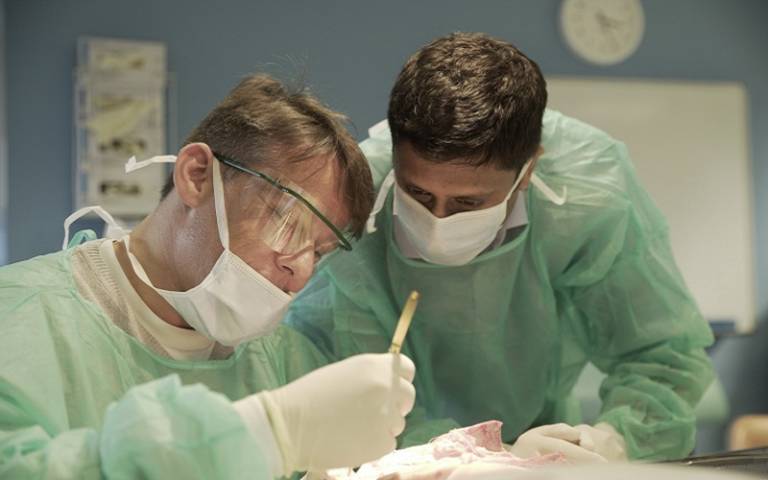The role of mentoring in implant training
16 April 2018

By Dr Pareet Shah, Mentor and Deputy Director of our Postgraduate Diploma in Implant Dentistry.
The demand for implant treatment has increased tremendously over the last 15-20 years, and the provision of implant treatment has revolutionised our approach to the management of the failing dentition and the replacement of missing teeth.
Although implant treatment is predictable, to obtain optimal results several factors must be favourable. Careful patient selection, treatment planning and skilled treatment provision can only be provided by dentists that are adequately trained in implant dentistry.
Complaints regarding implant dentistry are increasing and the resolution of complications can be very costly and time consuming.
The ‘Training Standards in Implant Dentistry 2016’ published by the Faculty of General Dental Practice provides guidance for dentists wishing to carry out safe implant dentistry.
One of the recommendations is that implant dentistry trainees should have a suitably trained and experienced clinician acting as a mentor.
The mentor’s primary role is to aid the clinician’s implant training by supplementing the theoretical aspects from training courses. This will provide support so that the practical and clinical elements can be provided in a safe, patient-centred manner.
The mentor
Being able to guide a novice in a new procedure, to becoming a safe and skilled clinician is a very fulfilling aspect of our profession.
A common perception is that the mentor just turns up on the day of surgery to cover the implant surgery. In reality, the mentor’s role is to support the clinician during their postgraduate education and entire implant pathway for their patients. This includes patient assessment and selection, treatment planning, surgical placement, restoration and management of any complications should they arise, plus preparation for any postgraduate exams.
In addition, the mentor may often give advice about the logistical preparation for treatment. This may range from helping when draping up for surgery to giving a detailed list of equipment and consumables required for comprehensive treatment.
The mentor is also there to support reflective learning throughout patient care so that the clinician can develop their career in the desired direction.
The mentor may not need to attend for each patient visit but should be available for advice where required. This may involve advice over the phone or meeting up to discuss laboratory work.
The early mentored cases will be simple in nature, aimed towards gaining initial postgraduate qualifications. As the clinician’s experience develops the mentor can provide guidance for more complex cases, such as those requiring augmentation.
Every dentist should have in place a personal development plan for ongoing training, as part of which they may then wish to practice at a more advanced level. The mentor will be a valuable source of support throughout your career when and be a valuable source of support for many years to come.
What makes a good mentor?
This is a difficult question to answer! Currently, there is no recognised ‘approved’ list of mentors and no formal qualification, so prospective implant clinicians have to use a number of factors when choosing a mentor. The onus is on the clinician’s judgement to select an appropriate mentor.
Here are a few things that I think that help, but it is by no means an exhaustive list:
- Ideally a mentor should have some formal postgraduate qualification which encompasses implant dentistry. This could range from a postgraduate diploma in implant dentistry, to specialist qualifications in prosthodontics, oral surgery or other restorative disciplines. Ultimately, the mentor should be able to demonstrate a sound, scientific basis for their advice.
- Previous teaching experience including clinical supervision on an implant training programme is very valuable. Mentors also need to develop their teaching skills! These are often developed with the support of senior colleagues in a postgraduate teaching environment. If they also have experience mentoring in the practice environment this will greatly benefit new trainees. The mentor will have come across many differing scenarios and will be able to tailor your experience to your particular educational needs and practice environment. Don’t be afraid to ask to speak to previous mentees for their reviews.
- It is important to develop an informal rapport with your mentor. A good mentor not only has the necessary clinical skills but is able to communicate new concepts effectively to you. If you feel that you are struggling with something you should feel comfortable in discussing this with them openly.
- It is important to consider how readily will you be able to call on their help if complications arise. Check their availability if you need help at short notice. This is does not necessarily mean them coming to your practice immediately, but can they be reached by phone or email if needed?
- Finally, check that the mentor is able to support you with an implant system that you are familiar with. You may need advice specific to a system, so it helps if the mentor has in-depth knowledge of the surgical and restorative aspects of your preferred implant system.
How to find a good mentor
As I previously mentioned, there is no recognised list of mentors, but there are various reliable ways to find a suitable mentor. If you already have someone suitable in-house then you have a great advantage, and in my opinion, this is the best-case scenario.
Most of my mentees approach me by recommendation. If you take a postgraduate course such as our Diploma in Implant Dentistry then you could ask a tutor to become your mentor.
Many dentists have contacted local specialists/referral dentists, and this helps to develop a strong professional relationship with trusted colleagues.
The Association of Dental Implantology has a Register of Mentors which allows you to search by location and implant system which may be a useful starting point.
Another valuable source of information is your technician and dental laboratory. If they are based locally, they will be able to recommend clinicians. I have found that dentists that have a good relationship with their technician are often great educators.
Last, but not least, some implant companies may provide a list of mentors, but this list may not be vetted as the requirements for being on an implant company’s list of mentors may be variable.
Once you have identified a potential mentor, arrange to meet them and you may even ask if you can observe them mentoring.
Fees, equipment and contracts
Before you plan and book in cases, ensure that you have a clear understanding of the fees charged. Some mentors charge per hour, some per case.
Also ensure that you have agreed who is providing any equipment and components. Make a checklist prior to any appointments and review it in advance. If everyone is well prepared, the entire experience is much more enjoyable and productive.
The mentor will have some medico-legal responsibility for any treatment carried out under their supervision. Depending on the specifics of each case, the mentor and mentee will have varying degrees of liability. Before embarking on treatment, it is important that each party understands their obligations to each other, and more importantly, to the patient. It is also essential for both mentors and mentees to contact their respective indemnifiers to ensure that they have adequate cover for mentoring and training respectively.
Accordingly, it’s important to have a written agreement covering aspects such as the protocols that you will follow, the responsibilities of each party and fees.
Finally, ensure that your patients are aware that you are training in dental implants, but are working under the guidance of a mentor and that they may be present for some appointments.
 Close
Close





